Available pre-order microcomputer Edison board for the Internet of things from Intel
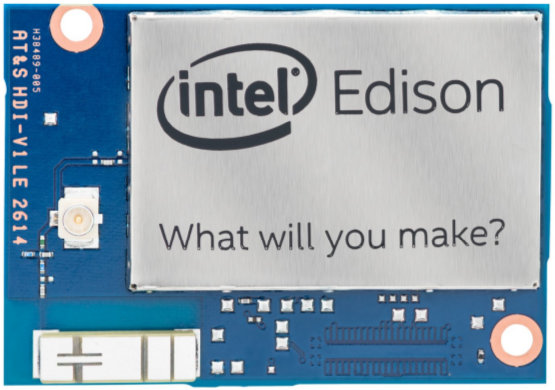
Intel at CES 2014 announced the release of the Intel Edison platform - a ready-to-use general-purpose computing environment that supports wireless data transfer. It is designed for inventors, entrepreneurs, and developers creating compact or wearable devices. The Intel Edison platform microcomputer was similar to an SD card, but the final release had changed a lot. Currently, development kits are already available for the Edison board, and it is possible to launch Linux (special Yocto project for small devices ), as well as RTOS .
Data sheet
- Processor: SoC "Tangier", includes two cores Intel Atom (Silvermont) processor (22nm) processor @ 500 MHz and 32-bit Intel Quark micro-controller @ 100 MHz
- RAM: 1 GB LPDDR3 (PoP memory) - 2 channel 32bits @ 800MT / sec
- User memory: 4 GB eMMC (v4.51 spec) + micro SD card slot
- Network: 802.11 a / b / g / n Wi-Fi (supporting 5 GHz, Broadcom 43340 chip) with built-in antenna or external, and Bluetooth 4.0
- USB: one micro USB connector
- Programmable contacts:
- 2x UART (1 full flow control, 1 Rx / Tx)
- 2x I2C, 1x SPI with 2 chip selects
- 1x I2S
- 12x GPIO including 4 PWM pins
- Connection of peripheral modules: 70-pin connector (Hirose DF40 series - 1.5, 2.0, or 3.0 mm stack height)
- Power supply: input from 3.3 to 4.5 V; output: 100mA @ 3.3V and 100 mA @ 1.8V
- Power Modes: Standby (no radio): 13 mW; standby (Bluetooth 4.0): 21.5 mW (BLE in Q4 2014); Standby (Wi-Fi): 35 mW.
- Dimensions: 35.5 × 25.0 × 3.9 mm
- Operating temperature range: 0 to 40 ° C
The Edison board includes the Intel Atom, which runs under Linux version Yocto 1.6, and Quark MCU under ViperOS (a truncated version of Wind River VxWorks). The developer’s tools include the Arduino IDE, Eclipse with C, C ++ support, Python support, and Intel XDK for Node.JS and HTML5 developers. SDK and IDE will be available soon for Quark MCU. The Intel IoT Analytics Platform is a cloud-based device solution available for limited and non-commercial use.

Block diagram of the work of Edison
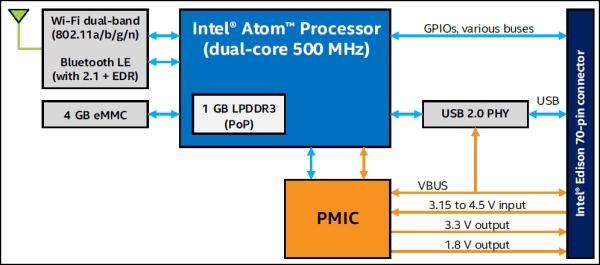
Edison Appearance
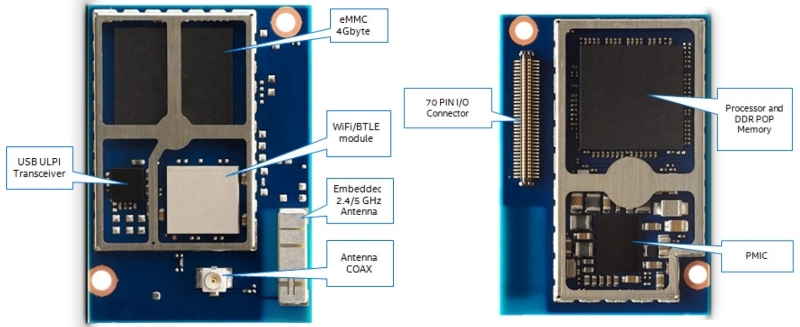
')
Edison board is a basic module with a minimalist design, so Intel has developed two use cases:
Intel Edison Board for Arduino - a board with Bluetooth and Wi-Fi, compatible with Arduino UNO contacts, except for the support of only 4 PWM (there are 6 of them in the Arduino UNO)
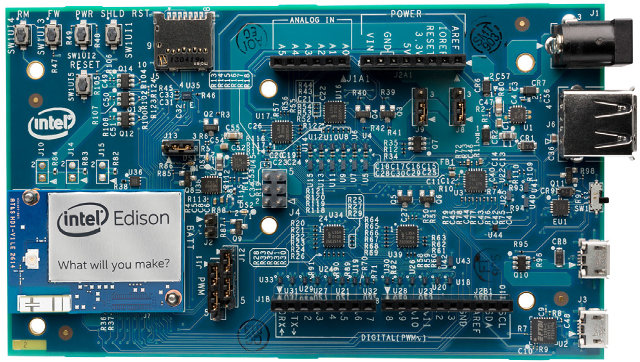
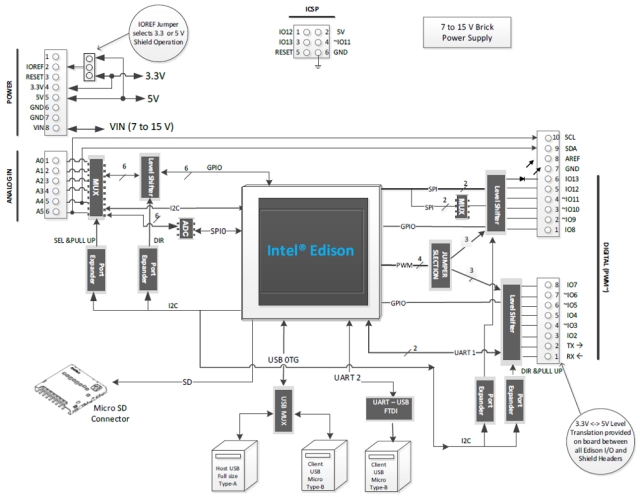
The Intel Edison debug card is a small board with the following interfaces and features:
- native support for 1.8 VI / O from Edison module
- 0.1 ″ grid I / O contact array for contact soldering
- USB OTG with USB Micro Type-AB connector
- USB OTG (with power switching)
- Battery Support
- USB Bridge - UART, micro Type-B connector
- DC power (7 to 15 VDC)
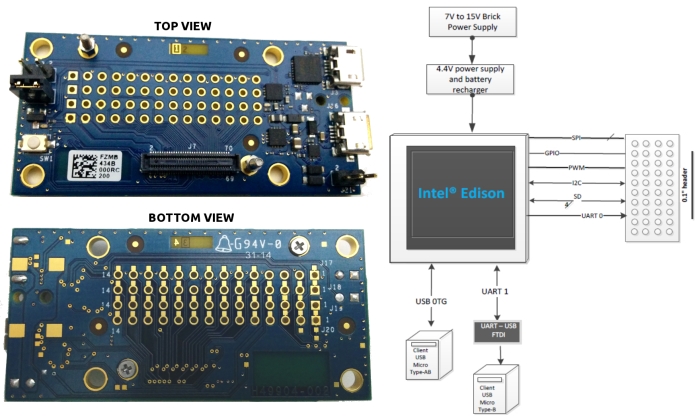
In addition, SparkFun has developed its own version of the blocks (modules) connected according to the stack scheme for Edison
SparkFun Blocks for Edison.
SparkFun, a reseller of Edison and debugging boards, developed its own version of stackable blocks for Edison “SparkFun Blocks”, built by analogy to modules for Arduino. The cost of the blocks varies from $ 15 per base, with I2C and GPIO bus, to $ 70 per set Edison Sensor Pack, which includes block 9 Degrees of Freedom (9DOF) with an OLED display and microSD card.
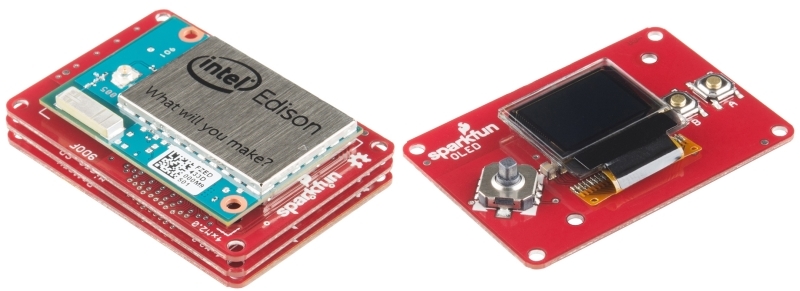
Additional units include support for ADC (ADC), Arduino, PWM (PWM), console and dual-channel motor driver (Dual H-Bridge). For battery life, SparkFun introduced a 400mAh LiPo battery module.
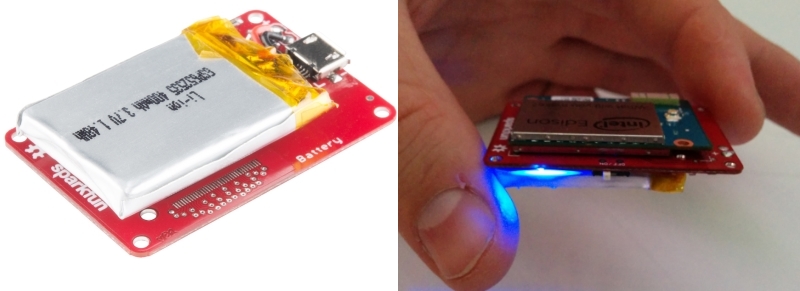
In the video below, SparkFun shows Edison and his decision SparkFun Blocks for Edison.
The documentation includes a brief description, an Edison board guide for the Arduino and a debug board, an Arduino IDE, and instructions for downloading the Yocto BSP from Intel's Edison Board page .
Pre-order:
Intel Edison on Sparkfun will cost $ 49.95
with Edison Board for Arduino - $ 107
Intel Edison Debug Card - $ 75
Starter Pack - $ 114.95
Sending pre-orders is expected within 6 - 8 weeks. By the end of this year, Intel Edison will be available in 65 countries.
PS post updated
Source linuxgizmos.com
Source: https://habr.com/ru/post/236701/
All Articles